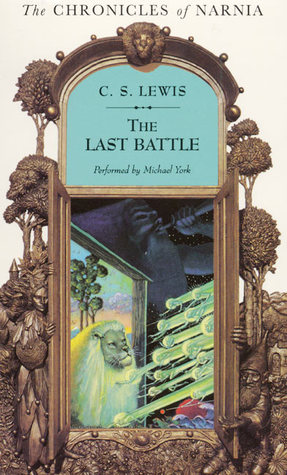Prince Tirian and his best friend Jewel the unicorn hear that Aslan has returned and formed an alliance with the Calormen, and he has ordered the living forest of nyads and dryads cut down. After all, he’s not a tame lion. But when Prince Tirian is captured, he prays to the old kings and queens of Narnia, causing Eustace and Jill to return, and they go behind enemy lines to find out who is the real Aslan and who is the impostor.
Even as an adult, if you were to quote the phrase “further up and further in” to me on any given day, my pupils will dilate and my mind will be transported to a place of rolling green hills, bright sunshine, and mountains unimaginably tall. Reepicheep is there; Mr and Mrs Beaver are there; everyone you’ve ever loved is there. And reading the last quarter of the The Last Battle is just as magical and surreal and euphoric as I remember.
The characters of Shift and Puzzle are also a fantastic and yet uncomfortable pair to begin the last story of Narnia. Shift is an old and ugly and clever ape, who starts the plot for power, of which he eventually loses control. Puzzle is a good donkey, who wants to help his clever friend the ape in any way possible, and he never really meant any harm.
Notably missing from Aslan’s true country is Susan Pevensie. Apparently Aslan cannot forgive her interest in “nylons, lipstick, and invitations”. Sure, I can understand that she no longer believes in Narnia now that she is a grown-up, but each of the children has lost faith before, and Aslan showed them all right again. Heed the warning from Clive Lewis himself, God wants you to keep your childlike wonder, lest you be stricken from the eternity of heaven, where even those who never heard of Narnia (like the Pevensie parents) get to go eventually.
In the previous volumes of the series, I was able to shut my eyes against the Christian allegory and read the books for the stories themselves, but those parallels are not at all subtle in this last book. Pacifist new-agers who believe that all religions are but a different side of the same coin are targeted here, when Aslan and Tash are combined into a single god, Tashlan. Humble agnostics are targeted through the portrayal of weak talking animals. Defiant atheists are targeted as a power-hungry Calormen and cat team up to trick the gullible animals who only want to protect themselves against the wrath of whichever god is currently attacking them.
In addition to the religious dogma, the racism is palpable. Prince Tirian, Eustace, and Jill all smear their faces with oil that make their skin as dark as the Calormens, even though they rescue Jill the Unicorn from only one inept Calormen guard in the dark. The Calormen are even referred to in this volume as “darkies”, who “stink of onions and garlic”, and “whose white eyes flash dreadfully in their brown faces.” I dread children reading these passages.
Recommended as the conclusion to the series of the wonderful world of Narnia! If you can bear it, skim until the end, and follow up with Neil Gaiman’s short story, “The Problem of Susan”, in the anthology Fragile Things.
“I have come home at last! This is my real country! I belong here. This is the land I have been looking for all my life, though I never knew it till now…Come further up, come further in!”
